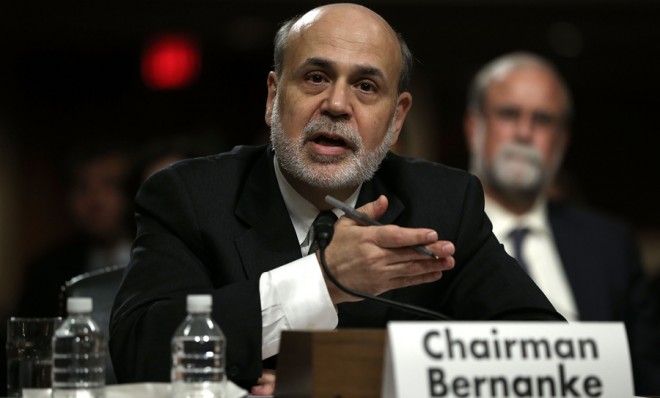Is the Fed setting the stage for another financial crisis — in Asia?
The side effects of quantitative easing are coming to the fore

A free daily email with the biggest news stories of the day – and the best features from TheWeek.com
You are now subscribed
Your newsletter sign-up was successful
India's rupee dropped to a new low Thursday of 64.56 to the U.S. dollar, down 15 percent since May — leading the pack of plunging currencies across South and Southeast Asia.
India's economic woes represent an unwelcome turn of events for the country, which used to share the spotlight with China as one of the world's rising economic stars. And while several factors have contributed to India's troubles, the rupee's severe decline in currency markets can largely be attributed to a source closer to home: The U.S. Federal Reserve.
Since the financial crisis, the Fed has unleashed three massive waves of quantitative easing, the most current being a program to buy $85 billion worth of Treasurys and mortgage-backed securities a month. The idea was to flood the market with easy money to encourage borrowing after losses in the subprime market led to a global credit crunch.
The Week
Escape your echo chamber. Get the facts behind the news, plus analysis from multiple perspectives.

Sign up for The Week's Free Newsletters
From our morning news briefing to a weekly Good News Newsletter, get the best of The Week delivered directly to your inbox.
From our morning news briefing to a weekly Good News Newsletter, get the best of The Week delivered directly to your inbox.
Central bankers "always knew it was extremely risky," says The Guardian's Heather Stewart, "but judged that the price of a prolonged slump across the rich world was greater than the threat of inflating unsustainable bubbles in the world's financial markets."
But bubbles are what appear to have formed, with a lot of that new, easy money finding its way to higher-yielding bonds in emerging nations."If you are tired of earning a piddling 2 percent on your U.S. Treasury bonds," explains Neil Irwin of The Washington Post, "a rate pushed low by the fact that the Fed has been buying them, then making 5 percent on your money in Indonesian bonds or 7 percent from Indian bonds looks pretty good, even with the greater risk attached."
In May, Fed Chairman Ben Bernanke said the Fed aims to start reeling in — or "tapering" in central-bank-ese — the stimulus program as soon as later this year. If U.S. employment grows steadily, the Fed says it hopes to wean the economy off quantitative easing by next summer — which implies a lot less money will flow to India, Indonesia, and other emerging markets.
Now, every time Bernanke tosses around the "T" word, emerging markets stress out, and what we're seeing now is something like a panic attack. In India, interest rates are rocketing (they're up to 9.48 percent on 10-year government bonds), and the rupee is plummeting, causing foreign investors to withdraw funds and leaving Indian companies unable to pay loans, many of which are denominated in dollars.
A free daily email with the biggest news stories of the day – and the best features from TheWeek.com
The rupee's fall is "out of control," Lasanka Perera, managing director at Admiral Markets, told CNBC.
But tapering is just the beginning. Once the snowball gets rolling, it could turn into an avalanche. Here's Irwin again:
Rather, what is happening in emerging markets seems to be a classic tale of how markets can behave irrationally when there is panic in the air. The sell-off in the Indian rupee and Indian bonds leads interest rates up and sparks fear of what it will mean for the price of imported oil and other products in the world’s second-most populous nation. That in turn sparks fears of political unrest and/or higher government budget deficits to contain the economic damage, which in turn make the rupee and Indian bonds even less attractive. [The Washington Post]
Indeed, it's not only India that's experiencing withdrawal symptoms, so to speak. Indonesia and Thailand have also experienced currency and market swings of late, fueling concern that the Fed, in rescuing the U.S. economy, has set the stage for a repeat of the 1997-98 Asian financial crisis.
Carmel Lobello is the business editor at TheWeek.com. Previously, she was an editor at DeathandTaxesMag.com.
-
 Health insurance: Premiums soar as ACA subsidies end
Health insurance: Premiums soar as ACA subsidies endFeature 1.4 million people have dropped coverage
-
 Anthropic: AI triggers the ‘SaaSpocalypse’
Anthropic: AI triggers the ‘SaaSpocalypse’Feature A grim reaper for software services?
-
 NIH director Bhattacharya tapped as acting CDC head
NIH director Bhattacharya tapped as acting CDC headSpeed Read Jay Bhattacharya, a critic of the CDC’s Covid-19 response, will now lead the Centers for Disease Control and Prevention